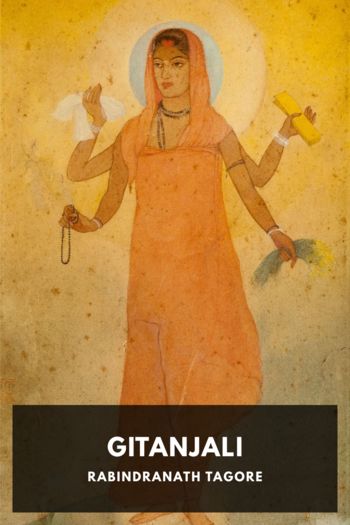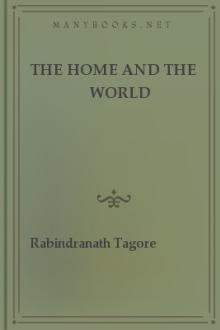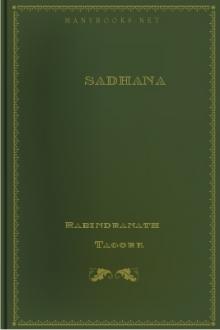author - "Rabindranath Tagore"

Description
Widely regarded as one of the most important figures in Indian (and more specifically Bengali) literary history, Rabindranath Tagore was the first Indian—indeed, the first person outside Europe—to win the Nobel Prize in Literature, largely in recognition of his “spiritual offering of songs,” Gitanjali.
Tagore himself translated the poems from the original Bengali, taking many liberties in the process. His English translation is rightly recognized as a work distinct from the Bengali original, consisting of major revisions, many elisions, and many poems originally published in other collections.
Tagore’s lyrical simplicity, vivid imagery, and themes of nature, spirituality, death, and transcendence combine to produce a truly unique, powerfully moving work of thoughtful beauty. For many who read it, Tagore’s words in Song XCVI ring true: “What I have seen is unsurpassable. I have tasted of the hidden honey of this lotus that expands on the ocean of light, and thus I am blessed.”

The raindrops kissed the earth and whispered,--"We are thy
homesick children, mother, come back to thee from the heaven."
161
The cobweb pretends to catch dew-drops and catches flies.
162
Love! when you come with the burning lamp of pain in your hand, I can see your face and know you as bliss.
163
"The learned say that your lights will one day be no more." said the firefly to the stars.
The stars made no answer.
164
In the dusk of the evening the bird of some early dawn comes to the nest of my silence.
165
Thoughts pass in my mind like flocks of ducks in the sky.
I hear the voice of their wings.
166
The canal loves to think that rivers exist solely to supply it with water.
167
The world has kissed my soul with its pain, asking for its return in songs.
168
That which oppresses me, is it my soul trying to come out in the open, or the soul of the world knocking at my heart for its entrance?
169
Thoug

s postman when I grow up.
WATCHMAN. Ha! ha! Postman, indeed! Rain or shine, rich orpoor, from house to house delivering letters--that's very greatwork!
AMAL. That's what I'd like best. What makes you smile so? Oh,yes, your work is great too. When it is silent everywhere in theheat of the noonday, your gong sounds, Dong, dong, dong,-- andsometimes when I wake up at night all of a sudden and find ourlamp blown out, I can hear through the darkness your gong slowlysounding, Dong, dong, dong!
WATCHMAN. There's the village headman! I must be off. If hecatches me gossiping with you there'll be a great to do.
AMAL. The headman? Whereabouts is he?
WATCHMAN. Right down the road there; see that huge palm-leafumbrella hopping along? That's him!
AMAL. I suppose the King's made him our headman here?
WATCHMAN. Made him? Oh, no! A fussy busy-body! He knows somany ways of making himself unpleasant that everybody is afraidof him. It's just a game for the likes of him, making

it, likewise, if the daughter-in-law [7] of the Rajah's house had left its seclusion. She was even prepared for this happening. But I did not consider it important enough to give her the pain of it. I have read in books that we are called "caged birds". I cannot speak for others, but I had so much in this cage of mine that there was not room for it in the universe--at least that is what I then felt.
The grandmother, in her old age, was very fond of me. At the bottom of her fondness was the thought that, with the conspiracy of favourable stars which attended me, I had been able to attract my husband's love. Were not men naturally inclined to plunge downwards? None of the others, for all their beauty, had been able to prevent their husbands going headlong into the burning depths which consumed and destroyed them. She believed that I had been the means of extinguishing this fire, so deadly to the men of the family. So she kept me in the shelter of her bosom, and trembled if I was in the least bit unwell.

linkwith the infinite, judges his activity by its movement and not bythe repose of perfection--the repose which is in the starryheavens, in the ever-flowing rhythmic dance of creation.
The first invasion of India has its exact parallel in theinvasion of America by the European settlers. They also wereconfronted with primeval forests and a fierce struggle withaboriginal races. But this struggle between man and man, and manand nature lasted till the very end; they never came to anyterms. In India the forests which were the habitation of thebarbarians became the sanctuary of sages, but in America thesegreat living cathedrals of nature had no deeper significance toman. The brought wealth and power to him, and perhaps at timesthey ministered to his enjoyment of beauty, and inspired asolitary poet. They never acquired a sacred association in thehearts of men as the site of some great spiritual reconcilementwhere man's soul has its meeting-place with the soul of theworld.
I do not for a mo

s going on," I said, "and I am busy. Could you perhaps come another day?"
At once he turned to go; but as he reached the door he hesitated, and said: "May I not see the little one, sir, for a moment?" It was his belief that Mini was still the same. He had pictured her running to him as she used, calling "O Cabuliwallah! Cabuliwallah!" He had imagined too that they would laugh and talk together, just as of old. In fact, in memory of former days he had brought, carefully wrapped up in paper, a few almonds and raisins and grapes, obtained somehow from a countryman; for his own little fund was dispersed.
I said again: "There is a ceremony in the house, and you will not be able to see any one to-day."
The man's face fell. He looked wistfully at me for a moment, then said "Good morning," and went out.
I felt a little sorry, and would have called him back, but I found he was returning of his own accord. He came close up to me holding out his offerings with the words: "I brought these few

Description
Widely regarded as one of the most important figures in Indian (and more specifically Bengali) literary history, Rabindranath Tagore was the first Indian—indeed, the first person outside Europe—to win the Nobel Prize in Literature, largely in recognition of his “spiritual offering of songs,” Gitanjali.
Tagore himself translated the poems from the original Bengali, taking many liberties in the process. His English translation is rightly recognized as a work distinct from the Bengali original, consisting of major revisions, many elisions, and many poems originally published in other collections.
Tagore’s lyrical simplicity, vivid imagery, and themes of nature, spirituality, death, and transcendence combine to produce a truly unique, powerfully moving work of thoughtful beauty. For many who read it, Tagore’s words in Song XCVI ring true: “What I have seen is unsurpassable. I have tasted of the hidden honey of this lotus that expands on the ocean of light, and thus I am blessed.”

The raindrops kissed the earth and whispered,--"We are thy
homesick children, mother, come back to thee from the heaven."
161
The cobweb pretends to catch dew-drops and catches flies.
162
Love! when you come with the burning lamp of pain in your hand, I can see your face and know you as bliss.
163
"The learned say that your lights will one day be no more." said the firefly to the stars.
The stars made no answer.
164
In the dusk of the evening the bird of some early dawn comes to the nest of my silence.
165
Thoughts pass in my mind like flocks of ducks in the sky.
I hear the voice of their wings.
166
The canal loves to think that rivers exist solely to supply it with water.
167
The world has kissed my soul with its pain, asking for its return in songs.
168
That which oppresses me, is it my soul trying to come out in the open, or the soul of the world knocking at my heart for its entrance?
169
Thoug

s postman when I grow up.
WATCHMAN. Ha! ha! Postman, indeed! Rain or shine, rich orpoor, from house to house delivering letters--that's very greatwork!
AMAL. That's what I'd like best. What makes you smile so? Oh,yes, your work is great too. When it is silent everywhere in theheat of the noonday, your gong sounds, Dong, dong, dong,-- andsometimes when I wake up at night all of a sudden and find ourlamp blown out, I can hear through the darkness your gong slowlysounding, Dong, dong, dong!
WATCHMAN. There's the village headman! I must be off. If hecatches me gossiping with you there'll be a great to do.
AMAL. The headman? Whereabouts is he?
WATCHMAN. Right down the road there; see that huge palm-leafumbrella hopping along? That's him!
AMAL. I suppose the King's made him our headman here?
WATCHMAN. Made him? Oh, no! A fussy busy-body! He knows somany ways of making himself unpleasant that everybody is afraidof him. It's just a game for the likes of him, making

it, likewise, if the daughter-in-law [7] of the Rajah's house had left its seclusion. She was even prepared for this happening. But I did not consider it important enough to give her the pain of it. I have read in books that we are called "caged birds". I cannot speak for others, but I had so much in this cage of mine that there was not room for it in the universe--at least that is what I then felt.
The grandmother, in her old age, was very fond of me. At the bottom of her fondness was the thought that, with the conspiracy of favourable stars which attended me, I had been able to attract my husband's love. Were not men naturally inclined to plunge downwards? None of the others, for all their beauty, had been able to prevent their husbands going headlong into the burning depths which consumed and destroyed them. She believed that I had been the means of extinguishing this fire, so deadly to the men of the family. So she kept me in the shelter of her bosom, and trembled if I was in the least bit unwell.

linkwith the infinite, judges his activity by its movement and not bythe repose of perfection--the repose which is in the starryheavens, in the ever-flowing rhythmic dance of creation.
The first invasion of India has its exact parallel in theinvasion of America by the European settlers. They also wereconfronted with primeval forests and a fierce struggle withaboriginal races. But this struggle between man and man, and manand nature lasted till the very end; they never came to anyterms. In India the forests which were the habitation of thebarbarians became the sanctuary of sages, but in America thesegreat living cathedrals of nature had no deeper significance toman. The brought wealth and power to him, and perhaps at timesthey ministered to his enjoyment of beauty, and inspired asolitary poet. They never acquired a sacred association in thehearts of men as the site of some great spiritual reconcilementwhere man's soul has its meeting-place with the soul of theworld.
I do not for a mo

s going on," I said, "and I am busy. Could you perhaps come another day?"
At once he turned to go; but as he reached the door he hesitated, and said: "May I not see the little one, sir, for a moment?" It was his belief that Mini was still the same. He had pictured her running to him as she used, calling "O Cabuliwallah! Cabuliwallah!" He had imagined too that they would laugh and talk together, just as of old. In fact, in memory of former days he had brought, carefully wrapped up in paper, a few almonds and raisins and grapes, obtained somehow from a countryman; for his own little fund was dispersed.
I said again: "There is a ceremony in the house, and you will not be able to see any one to-day."
The man's face fell. He looked wistfully at me for a moment, then said "Good morning," and went out.
I felt a little sorry, and would have called him back, but I found he was returning of his own accord. He came close up to me holding out his offerings with the words: "I brought these few